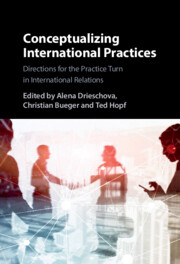23 results
1 - Conceptualizing International Practices
- from Part I - Introduction: Conversations and the Evolution of Practice Theorizing
-
-
- Book:
- Conceptualizing International Practices
- Published online:
- 09 June 2022
- Print publication:
- 23 June 2022, pp 3-27
-
- Chapter
-
- You have access
- HTML
- Export citation
Part III - Innovative Concepts
-
- Book:
- Conceptualizing International Practices
- Published online:
- 09 June 2022
- Print publication:
- 23 June 2022, pp 191-234
-
- Chapter
- Export citation
Part IV - Conclusion: The Future of Practice Theorizing
-
- Book:
- Conceptualizing International Practices
- Published online:
- 09 June 2022
- Print publication:
- 23 June 2022, pp 235-273
-
- Chapter
- Export citation
References
-
- Book:
- Conceptualizing International Practices
- Published online:
- 09 June 2022
- Print publication:
- 23 June 2022, pp 274-304
-
- Chapter
- Export citation
Table
-
- Book:
- Conceptualizing International Practices
- Published online:
- 09 June 2022
- Print publication:
- 23 June 2022, pp viii-viii
-
- Chapter
- Export citation
Contributors
-
- Book:
- Conceptualizing International Practices
- Published online:
- 09 June 2022
- Print publication:
- 23 June 2022, pp ix-x
-
- Chapter
- Export citation
Acknowledgements
-
- Book:
- Conceptualizing International Practices
- Published online:
- 09 June 2022
- Print publication:
- 23 June 2022, pp xi-xiv
-
- Chapter
- Export citation
Contents
-
- Book:
- Conceptualizing International Practices
- Published online:
- 09 June 2022
- Print publication:
- 23 June 2022, pp v-vi
-
- Chapter
- Export citation
Figures
-
- Book:
- Conceptualizing International Practices
- Published online:
- 09 June 2022
- Print publication:
- 23 June 2022, pp vii-vii
-
- Chapter
- Export citation
Part I - Introduction: Conversations and the Evolution of Practice Theorizing
-
- Book:
- Conceptualizing International Practices
- Published online:
- 09 June 2022
- Print publication:
- 23 June 2022, pp 1-44
-
- Chapter
- Export citation
12 - Conclusion
- from Part IV - Conclusion: The Future of Practice Theorizing
-
-
- Book:
- Conceptualizing International Practices
- Published online:
- 09 June 2022
- Print publication:
- 23 June 2022, pp 260-273
-
- Chapter
- Export citation
Copyright page
-
- Book:
- Conceptualizing International Practices
- Published online:
- 09 June 2022
- Print publication:
- 23 June 2022, pp iv-iv
-
- Chapter
- Export citation
Part II - Key Concepts of IR Scholarship
-
- Book:
- Conceptualizing International Practices
- Published online:
- 09 June 2022
- Print publication:
- 23 June 2022, pp 45-190
-
- Chapter
- Export citation
Index
-
- Book:
- Conceptualizing International Practices
- Published online:
- 09 June 2022
- Print publication:
- 23 June 2022, pp 305-308
-
- Chapter
- Export citation

Conceptualizing International Practices
- Directions for the Practice Turn in International Relations
-
- Published online:
- 09 June 2022
- Print publication:
- 23 June 2022
4 - Styles of Theorizing International Practice
-
-
- Book:
- Praxis as a Perspective on International Politics
- Published by:
- Bristol University Press
- Published online:
- 13 October 2022
- Print publication:
- 26 April 2022, pp 51-71
-
- Chapter
- Export citation
Explaining the European Union’s Foreign Policy: A Practice Theory of Translocal Action. By Magnus Ekengren. Cambridge: Cambridge University Press, 2018. 234p. $79.95 cloth.
-
- Journal:
- Perspectives on Politics / Volume 19 / Issue 1 / March 2021
- Published online by Cambridge University Press:
- 26 February 2021, pp. 339-340
- Print publication:
- March 2021
-
- Article
- Export citation
Pragmatic ordering: Informality, experimentation, and the maritime security agenda
-
- Journal:
- Review of International Studies / Volume 47 / Issue 2 / April 2021
- Published online by Cambridge University Press:
- 12 January 2021, pp. 171-191
- Print publication:
- April 2021
-
- Article
- Export citation
Meditating deformalization: remarks on ‘Of experts, helpers, and enthusiasts’
-
- Journal:
- International Theory / Volume 13 / Issue 3 / November 2021
- Published online by Cambridge University Press:
- 28 December 2020, pp. 546-551
-
- Article
- Export citation
Editors’ introduction to the first EJIS Junior-Senior Dialogue feature.
-
- Journal:
- European Journal of International Security / Volume 3 / Issue 3 / October 2018
- Published online by Cambridge University Press:
- 12 September 2018, pp. 279-280
- Print publication:
- October 2018
-
- Article
- Export citation



